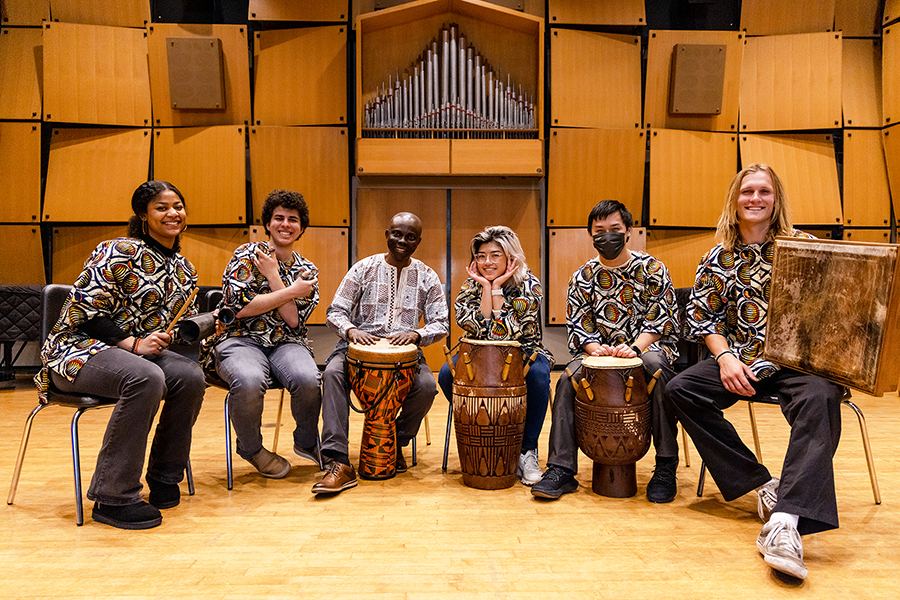
At the first session of his Introduction to World Music Cultures course, Professor Divine Kwasi Gbagbo poses a seemingly simple question to his students: What is music? By the end of the course, when making the same inquiry, the responses become nuanced — reflecting the contextual prism emphasized by Gbagbo, who last fall joined the LMU College of Communications and Fine Arts Music Department as an assistant professor of ethnomusicology.
“The takeaway I want for my students is that music is best understood through the context of its makers,” Gbagbo says. “When we return to that question, students say they now understand that to fully appreciate music, it’s best to learn why people make it the way they do, and how music connects different cultures.”
Gbagbo, who directs the World Music Ensemble in addition to teaching, has brought new energy to the department through his international perspective. Born and raised in Ghana, he grew up around music — traditional, church, and contemporary — and was performing in ensembles from an early age. After earning his bachelor’s degree in music, he spent 10 years teaching and heading a high school music department as well as directing music at a cathedral, before deciding to pursue graduate education in the United States. He earned his Ph.D in interdisciplinary arts from Ohio University, his dissertation examining the influence of Christianity on the music of the Ewe people of Ghana, the ethnic group to which Gbagbo belongs.
“I want students to see themselves as members of the same family, interacting through the different rhythms they play as a demonstration of how we live and depend on each other”
In leading the World Music Ensemble at LMU, Gbagbo has strived to build community through traditional and contemporary African music. “I want students to see themselves as members of the same family, interacting through the different rhythms they play as a demonstration of how we live and depend on each other,” Gbagbo explains. At the group’s November concert, ensemble members performed a collaborative piece with musicians from India and Brazil. In the future, Gbagbo hopes to brand the group specifically as an African music ensemble, with new percussive instruments brought in to expand the range of sounds.
Gbagbo is teaching two LMU Music courses, along with a first-year seminar. Introduction to World Music Cultures takes students through the Arabic world, sub-Saharan Africa, and the Americas, with guest speakers illustrating the intercultural influences on the music of each region. Sociology of Music examines Western influences on contemporary African music. “When you mention African music, what immediately comes to mind is traditional drumming, but I want my students to experience the aspects of African music that are not talked about as much, including the influence of Afro rock, R&B, jazz, calypso, reggae, and rumba,” Gbagbo says.
A first-year seminar, The Sounds of Resistance, looks at music’s important role in social justice movements — from the civil rights movement to Black Lives Matter in the U.S., as well as in other parts of the world, such as how music contributed to the defeat of apartheid in South Africa; how Chimurenga music was employed in the battle for political freedom in Zimbabwe; the use of punk rock and samba to fight repression in Brazil; and the important role of music and social media in the recent Hong Kong protests. “Sometimes the messages are coded and other times they’re more blunt, but music has always been a powerful rallying point all over the world,” Gbagbo says.
Gbagbo is also exploring new partnerships, including the potential for a CFA-hosted global arts festival. “LMU is a small community, but there is so much diversity and I would love to see that celebrated through music, dance, art and fashion,” Gbagbo says. “I came to LMU because it is a place that embraces diversity, equity and inclusion, and every day I am reminded that I made the right decision.”
Learn more about LMU’s World Music and Ethnomusicology program here.



